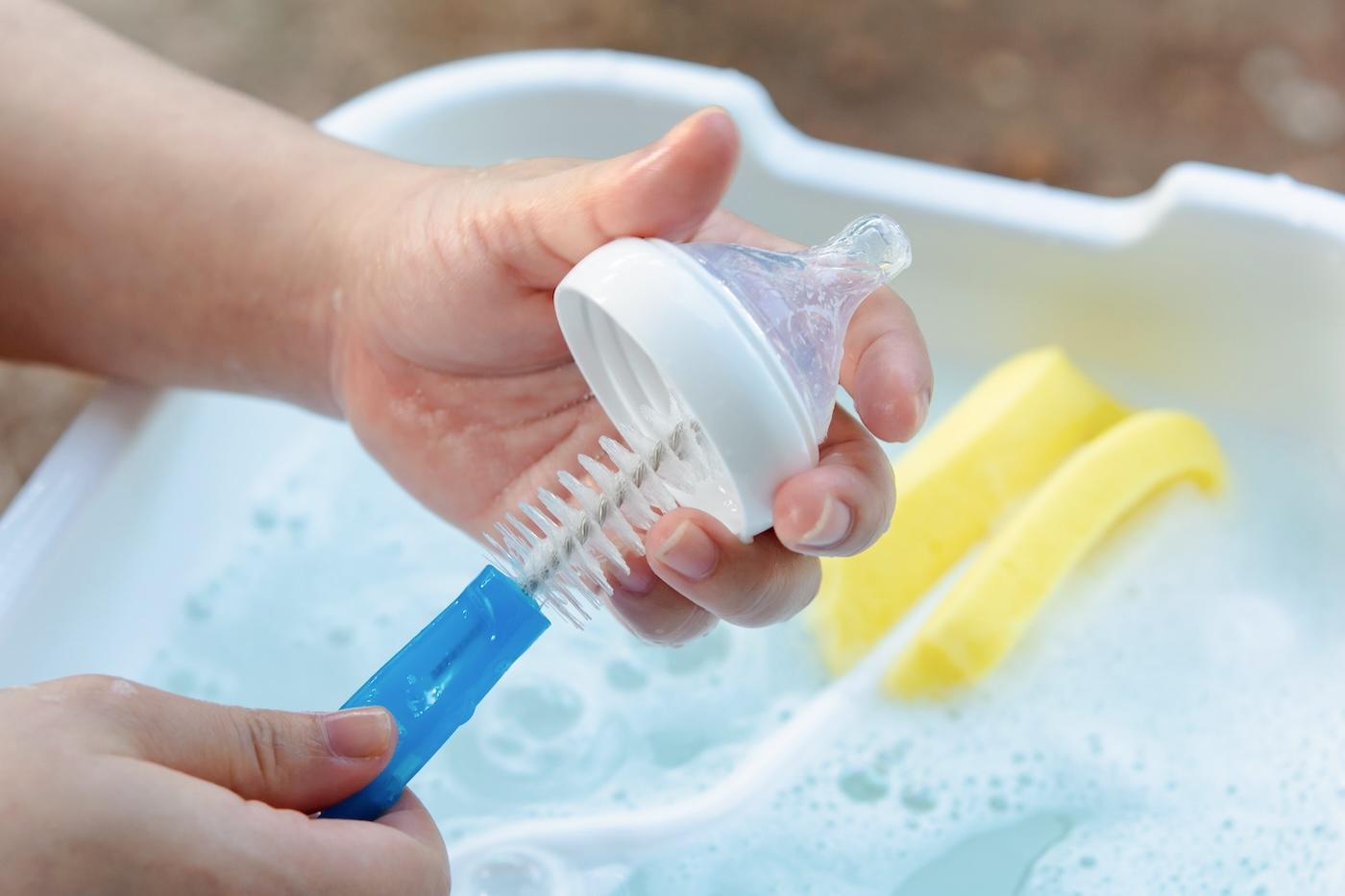BABY
7 Healthy Fats to Add to Your Baby’s Diet
Want to support your baby’s rapid growth and development? Just add fat!

Written by
Gabrielle McPherson, MS, RDN, LDN

Babies’ bodies make great strides in the growth department during their first year. But you probably knew that! You’re the ultimate witness to your baby outgrowing their diapers and sleepers at the speed of light. Who can resist those sweet thigh rolls and knuckle dimples? It’s no wonder babies need about half of their daily calories to come from fat.
But that’s not all fat does for your infant. Fat is a must-have nutrient for rapidly developing brains, nerves, and eyes—benefiting your baby's thinking skills and ability to see clearly. Read on to learn about seven healthy sources of fats you might want to consider adding to your little one’s high chair tray—and ideas for how to serve them!
Avocados
The creamy green fruit doesn’t shy away from offering lots of essential nutrients. Not only are avocados excellent sources of heart-healthy fats called monounsaturated fats, but they’re also brimming with fiber, folate, vitamin E, and B6.
Thanks to their impressive nutrition profile, avocados can help keep your little ones’ digestion and immune health in check. In addition, the fruit may help guide your baby’s growth by offering a cargo of calories in every munch.
How to serve avocado to your baby:
- Replace butter with avocados in a mini muffin recipe.
- Fork mash a quarter of an avocado and mix with one to two ounces of apple or pear puree.
Plain Whole Milk Yogurt
Babies can’t handle whole milk until 12 months of age, however whole milk yogurt is perfectly safe and healthy! Digesting yogurt is easy on baby’s tummy and it’s a rich source of probiotics to support a healthy gut. In addition to coming loaded with nutrients—including calories, protein, vitamin B12, and bone-building minerals such as calcium and phosphorus—whole milk yogurt is easy to eat and doesn’t require any prep (pro tip: Keep some on hand in the fridge for no-fuss meals!).
Full-fat yogurt contains saturated fat, as do most animal products. The Dietary Guidelines for Americans says to limit saturated fat for good health. But recent research tells us it may not be an enemy to health after all. So, skip the skim yogurt and reach for the full-fat. Also worth noting that the plain variety may not sound as yummy as vanilla or strawberry, but it contains less sugar (which helps protect your baby’s oral health).
How to serve yogurt to your baby:
- Add two tablespoons of baby oatmeal to two ounces of plain whole milk yogurt. Mix in ⅛ teaspoon of alcohol-free vanilla extract.
- Blend one ounce of pureed berries with two ounces of plain whole milk yogurt.
Extra Virgin Olive Oil
Olive oil is an easy addition to almost any food you offer your babe. It’s full of a monounsaturated fatty acid called oleic acid, or omega-9, granting it powerful inflammation-fighting antioxidant ingredients.
There are many types of olive oils on grocery shelves today. Be sure to look for extra virgin olive oil (EVOO). Compared to regular olive oil, EVOO is a bit pricier, but it’s also less processed and therefore has more nutrients.
How to serve extra virgin olive oil to babies:
- Mix a teaspoon of EVOO into mashed bananas and sprinkle with cinnamon.
- Drizzle EVOO onto sheet-pan roasted veggies and cut into small pieces or fork mash.
Light Tuna
Babies need essential fatty acids like DHA and EPA, two types of omega-3 fatty acids found in fish that support an infant’s brain and eye health. The catch? Fish can contain mercury, a heavy metal that can damage the nerves and brain in excessive amounts. According to the Environmental Protection Agency, canned light tuna has the lowest amount of mercury among tunas, making it the best bet for your babe. Still, stick to no more than one ounce of canned light tuna each week to be safe.
How to serve tuna to your baby:
- Mix a half ounce of canned light tuna with ⅛-¼ cup of plain yogurt.
- Offer your baby small pieces of tuna drizzled with EVOO to keep them moist.
Almond Butter
While peanut butter is the typical first choice for nut butters (experts recommend introducing potential allergens to babies early to prevent food allergies), almond butter is an excellent alternative that also boasts many nutrition benefits. Almond butter is loaded with calories to support all that growing babies do in their first year of life.
It also is a major source of monounsaturated fats, fiber, vitamin E, iron, protein, and calcium—all super important for a baby’s health. Tiny eaters have a greater chance of developing an iron deficiency, so almond butter can help keep their levels up!
How to offer almond butter to babies:
- Mix a teaspoon of almond butter into 2 ounces of plain whole milk yogurt.
- Mix a teaspoon of almond butter into 2 ounces of cooked baby barley cereal. Add breastmilk or formula if it gets too thick.
Ground Pumpkin Seeds
Also known as pepitas, pumpkin seeds are flat, oval, and green in appearance without their shell. Like nuts, they’re rich in monounsaturated fatty acids to build healthy hearts and fiber to keep our bowels moving smoothly. Pumpkin seeds contain a wealth of nutrition, including significant amounts of phosphorus, manganese, magnesium, and iron. Whole pumpkin seeds pose a choking risk, but you can make them safe for your bub to eat by grinding them in a high-power blender or food processor and mixing them into Baby’s food.
How to serve ground pumpkin seeds to your baby:
- Sprinkle 1 teaspoon of ground pumpkin seeds into 1/4 cup of mashed sweet potatoes.
- Add 1 teaspoon of ground pumpkin seeds into blueberry puree or offer halved fresh blueberries coated in ground pumpkin seeds.
Whole Eggs
When you give your baby cooked whole eggs (that means whites + yolks) you’re also serving up monounsaturated fats, polyunsaturated fats, iron, protein, zinc, and vitamin D. The most nourishing part of an egg is the yolk, so there’s no need to separate egg parts after cracking them open. With all that nutrition, eggs are hard to beat! Just be sure to thoroughly cook the eggs to reduce the risk of foodborne illness (uncooked eggs can carry salmonella).
How to serve your baby eggs:
- Whisk one egg with a half tablespoon of breastmilk and formula and scramble until fully cooked.
- Boil one egg for 10 to 12 minutes and cut it into small pieces.
More Healthy Eating Tips for Babies:
- The Best Proteins for Babies
- The Best Finger Foods for Babies
- The Best Foods for Babies 6 to 9 Months
- The Best Foods for Babies 10 to 12 Months
- How to Store Baby Food
***
REFERENCES
- USDA Dietary Guidelines for Americans 2020–2025
- Impact of Low-Fat and Full-Fat Dairy Foods on Fasting Lipid Profile and Blood Pressure: Exploratory Endpoints of a Randomized Controlled Trial, American Journal of Clinical Nutrition, September 2021
- Omega-9 Oleic Acid, the Main Compound of Olive Oil, Mitigates Inflammation during Experimental Sepsis, Oxidative Medicine and Cellular Longevity, November 2018
- U.S. Environmental Protection Agency: Guidelines for Eating Fish That Contain Mercury
Disclaimer: The information on our site is NOT medical advice for any specific person or condition. It is only meant as general information. If you have any medical questions and concerns about your child or yourself, please contact your health provider.
SHARE THIS ARTICLE
MOST LOVED
Sleepytime Sidekicks
More on Baby
About Gabrielle McPherson, MS, RDN, LDN
Gabrielle McPherson, MS, RDN, LDN is registered dietitian in Missouri who specializes in community and pediatric nutrition. Gaby is passionate about encouraging families to eat well in simple, practical ways that are realistic...and delicious! When not working, Gaby loves cooking, baking, and making messes and memories with her sous-chef/preschooler Charlotte.












